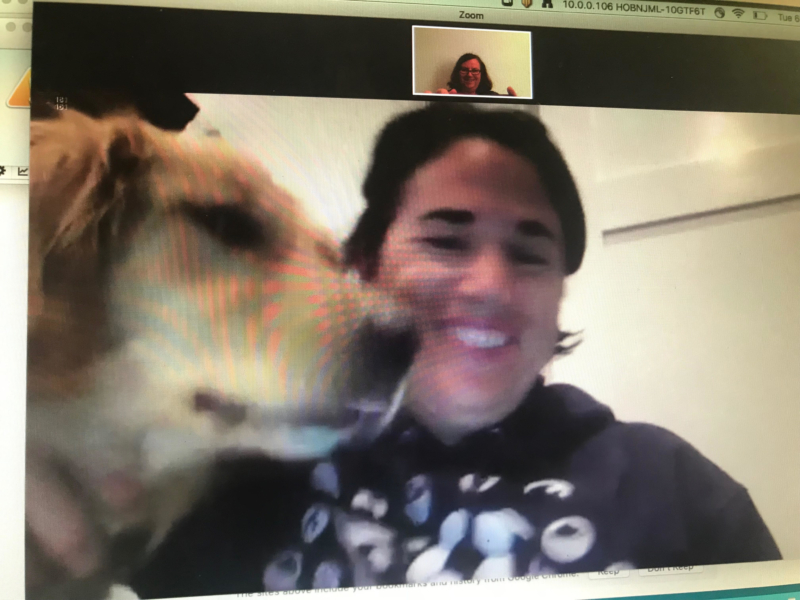My wife works for an educational company and her past few weeks have been busy working with schools and districts across California as they face the herculean task of adapting to distance learning for the remainder of the school year. One of my favorite stories from last week comes from a training that one of her colleagues was conducting with a school site. During the training, without skipping a beat, the trainer announced that his daughter had just handed him their pet mice and he was now doing the training with two mice in hand. What I love about this story is that it reminded everyone on the call that the guy who was doing the training is also a dad doing his best to manage his own family life.
For those of us who are lucky enough to work virtually during these unprecedented times, the stories about working remotely and the sudden ramp-up in video calls are often hilarious. Zoom bombs from spouses and kids asking what’s for dinner. People forgetting that the camera is on while going to the bathroom. People showing up to calls in pajamas.
But in addition to being hilarious, these stories are also very humanizing. We are seeing windows into people’s lives that we often don’t encounter in a working relationship. At least one onscreen pet is now pretty standard for any video call (and a welcome addition).
As someone who has three kids and has worked from home for years, having to manage background noise and distractions (albeit not for an entire workday) is nothing new. But what is new is no longer having to have to pretend that all of this other “stuff” is not going on in the background. Just a few weeks ago, I would desperately search for the mute button if my dog Oliver barked during a call with a client or make sure to prep my younger kids if I had a call scheduled after they were home from school. A couple of years ago when I had a weekly series of early morning virtual trainings with a client on the east coast dead smack in the middle of what is often the noisiest time in the house, my wife graciously turned it into Friday pancakes at IHOP to get the kids out of the house. My wife also works from home and the contortions we have both engaged in over the years to keep the pretense of having everything under control in the background have been sometimes funny and often exhausting. We have both been known to take a conference call from our car when desperate.
To say the least, all of those pretenses are gone. Suddenly, it’s ok to give an authentic answer when someone asks you how you are doing or to admit that the reason you aren’t available at a particular time is because your kid needs your help. And there is something very human about all of it.
I am struck by how many lessons of the trauma-informed and resilience-building movement are so salient right now–the importance of physical and emotional safety, the power of relationships and community to heal. I guess it makes sense–we are all experiencing a collective societal trauma right now. Dr. Rob Anda, one of the co-authors of the original Adverse Childhood Experiences (ACEs) study, a body of research that is foundational to our understanding of the impact of toxic stress physiology on health and behavior, reminds us that “It’s not just ‘them.’ It’s us.” This is one of those rare moments in time when I think we all truly understand what he meant.
The individual and collective suffering is no doubt real and will likely get much worse. By the end of last week, the number of deaths and infections continued to climb. Health care professionals, grocery stores workers, and other essential workers continue to put their lives at risk on the front lines of this pandemic. People are losing their jobs at an astonishing clip. The dad/trainer with the mice was furloughed from his job for three months (and my wife was reduced to 80%).
But the collective trauma and vulnerability we are all facing has also revealed acts of humanity, both large and small. It has led to unanticipated intimacy in places we may not have expected it. Seeing a toddler unexpectedly pop onto a parent’s lap (and the parent embrace them with a hug instead of shooing them away) during a zoom call is an act of astonishing beauty.
As Brene Brown says, “Imperfections are not inadequacies; they are reminders that we’re all in this together.”
And somehow every puppy that slobbers on a computer screen during a zoom call right now reminds me that we are indeed all in this together.
________________________________________________________________________________________________
Lori Chelius is a co-founder of Origins Training & Consulting. Origins helps educators, health care professionals, social service workers, and other leaders integrate a trauma-informed approach into their work so they can build more resilient organizations and communities. She lives in California with her wife, three kids, and their dog, Oliver. Learn more about Origins’ and its online training offerings at www.originstraining.org.







Leave a Reply
Want to join the discussion?Feel free to contribute!